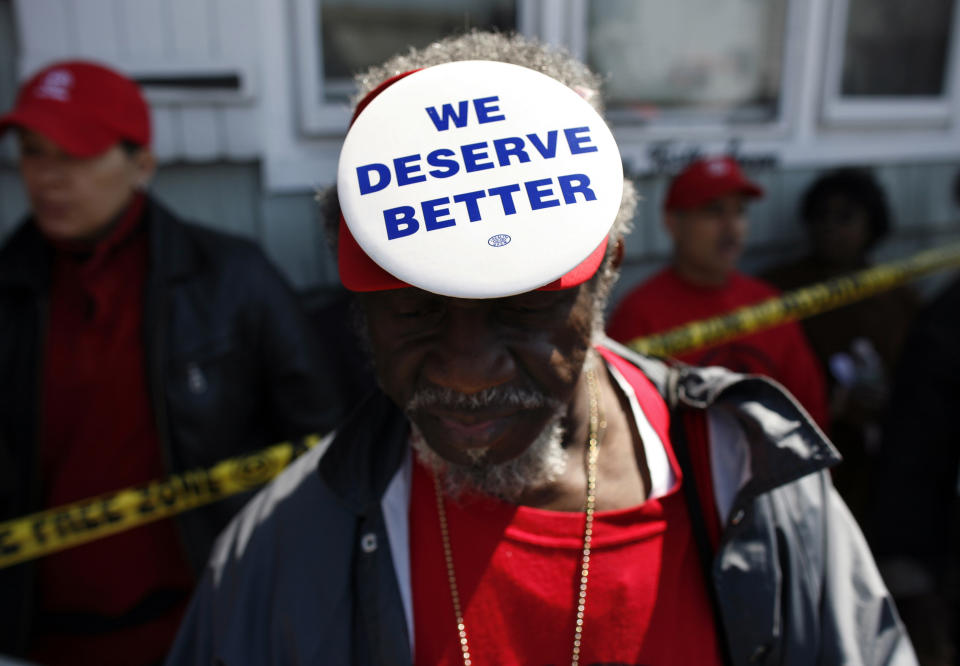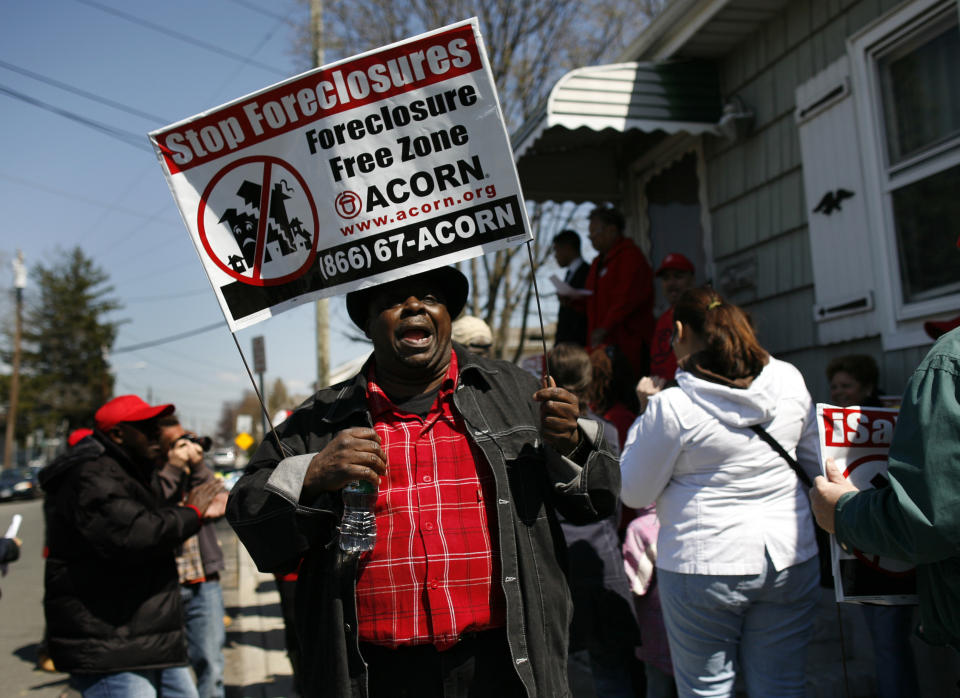Here's why utility disconnections are becoming a bigger problem: 'Money, Honestly' podcast
Due to the COVID-19 pandemic and the job losses that followed, millions of Americans are struggling to pay their utility bills as statewide protections start to expire.
A recent analysis from the National Energy Assistance Director’s Association finds that 179 million Americans are at risk of losing service. The NEADA also estimated that 15% to 20% of residential customers are at least 60 days behind on their electric and natural gas bills.
In the latest episode of Cashay’s Money, Honestly podcast, Cashay editor Janna Herron discusses with reporter Dhara Singh how the expiration of utility protections will impact Americans.
The episode is based on reporting Dhara did for Yahoo Money.

Janna: Hi, this is Money, Honestly. I'm Janna Heron. Today, Dhara Singh, a reporter on my team at Yahoo Money and Cashay is joining us. We'll be talking about utility shutoffs during the pandemic. Dhara, thank you so much for joining us.
Dhara: Yeah. Thank you for having me, Janna.
Janna: So let’s do a little background here. So during the pandemic, in the beginning, we had a lot of utility companies saying that you can miss payments and stuff, and we're working with people, where are we now?
Dhara: So it turned out there's no one standard set of rules, right? All these 50 States had different protections in place, not just for renters, I mean, not only just for renting, but also for protections in regard to having utilities shut down. And it just so happens now that we're in October, a lot of these protections have expired. And while President Trump did use CDC authority to extend a rent moratorium until December 31st, the utilities' aspect of all this is still up in the air. And in a lot of places such as Colorado there aren't these protections in place.
Janna: And we're talking about your electricity, right? Your water, your gas. And this is coming at a time when these protections are expiring when weather is getting colder, unemployment benefits, that extra $600 is no longer around. Doesn't seem to be a stimulus payment on the horizon. So what does a typical household pay in utilities? How much of a problem is this?
Dhara: This is pretty monumental. We're expecting 179 million Americans at risk of losing their service from this year alone. This is according to the National Energy Assistance Directors' Association, but just to give some background, I looked at some stats. So on an average, a typical U.S. household pays $167 a month on just utilities. Now for a lot of people listening, they may be like, "Well, that's not that much." But if you look at States such as Kansas, Idaho, Indiana, where minimum wage is $7 and 25 cents, think about it. A person's working 40 hours a week, they worked five days, suddenly 15% of their monthly paycheck goes to utilities. And now you get told this financial advice, we have to save three to six months worth of emergency expenses. You have to pay your rent and you have to go grocery shopping and X, Y, and Z. So that's not really leaving a lot of wiggle room for other needs.

Janna: Right. And you were talking about somebody who is actually working 40 hours a week, but we know a lot of people are still unemployed or they have reduced hours. Because for example, if you worked at a restaurant it's only 25% capacity in some States. So yeah, $167 is not chump change.
Dhara: Definitely not.
Janna: So has there been any proposals out there from DC that address this utility issue?
Dhara: Yes, there actually has been. Just your starters, there was some background in the $3, sorry, $3 trillion stimulus talks, which have unfortunately stalled. And I think with that, just in the most basic sense, the 1200 individuals would have gotten that could have gone a long way as to paying rent for one month, as well as covering utilities. Now, as a result of the CARES act, there was the PPP program. And that basically in a way, it's like a cycle where, because utility providers are depending on people like you and me to pair utility bills.
If they don't get any government relief, then they're most likely not going to be able to help people out. And so under the CARES act, utility companies had the option to borrow up to 2.5 times their average monthly payroll costs for their employees or $10 million, whichever is slower. And now a lot of companies did opt for that. But even with that, it's not much of a motivation for certain companies in rural areas because you don't have that many Americans to begin within these areas. So because you don't have that scale, you might not want to go that extra mile.

Janna: I see. Okay. And so in the beginning, when we started talking, you said 179 million Americans are at risk at losing service this year. Can you tell us a little bit more about the severity of the problem?
Dhara: Yeah, sure. So if we Zoom in on certain States, we can really understand this better. Washington Post had actually earlier reported on that in Wisconsin residents fell behind on their electricity bills in August, and we're talking about three in 10 customers. And so that was totally more than 235 million in debt the state records show. If you look at Nevada, you have more than 68,000 residents and also small businesses that fell behind on payments last month. This is according to the Nevada Power Company. And more than half of these payments are past due by 90 plus days. And now we're in this situation where yeah, these payments are past due and also the utility company is struggling because now it has 29.5 million in debt.
Janna: Right. So the utility company is not getting money, so that's a problem for them. And this also really comes at a time if you're thinking about electricity... I mean A, it's getting colder in a lot of places and B, you have a lot of schools that are doing remote learning and you need electricity to power that laptop.
Dhara: Yeah, you definitely do. Before the pandemic, I remember doing this piece about how so many communities are struggling with just broadband in general. And so a lot of these kids were going to their local libraries to get wifi access and things of that nature. These were public places. And now due to the pandemic, it's very hard to access these public places and the kids who unfortunately don't have access to internet and can't pay utilities, their parents’ families can't... They're not only getting behind on these social activities, but they're getting behind on e-learning and for those who are already suffering in terms of education and internet access, it's only going to get worse from here.
Janna: Right. Right. I didn't even think about that. But yeah, this has been a problem even before the pandemic. So you talked about Wisconsin, you talked about what was happening in Nevada. Are things different depending on where you live?
Dhara: A hundred percent. Every state, it's black, it's white, there's gray areas as well. For instance, in Colorado, you can seek utility relief based on a service. It depends on your service provider and you have to call them up. You have to tell them it's a coronavirus related hardship, words make all the difference. But there is no statewide mandate. So if someone doesn't want to give you relief, they literally don't have to. In Connecticut, there is a current moratorium in place for utility shutoffs, but that's going to end on October 31st. After that, there's going to be a separate protection.

It's called a Winter Protection Plan, and that will help people against service termination until May 1st. And Delaware also kind of follows Colorado's lead because it's a case by case basis with renters. There's no guarantee because you belong to a certain utility service or because you live in Delaware, you can be excused of paying your utility bills. And then in Kentucky the public service commission did order utility companies to stop disconnections for non-payments and late payment charges. But in places like Florida, it seemed like any light of progress was just dimmed. So-
Janna: Or turned off.
Dhara: Turned off. Yeah, perfect. Yeah, turned off. So there was a proposal filed last month by the League of United Latin American Citizens of Florida and other utility customers. And basically, they wanted to haul disconnections for at least 90 days. But this state regulators on Tuesday trimmed this down because what had happened was a lot of these utility companies are arguing that, "Hey, we are making, we are doing the best we can. We are offering payment plans." Yeah, there was already evidence that from there and that they were saying we're already helping consumers in a way. So it did rule in their favor and now we'll see what happens.
Janna: Right. Because even if you were offering payment plans, that might not be enough for people. Right? I mean, if you shut off somebody's power, you shut off somebody's power. And what about California? I know that's a big state. Anything going on there?
Dhara: Yeah. So California, good news if you live there because now service deposits [inaudible 00:10:49] eliminated, any connection fees they're eliminated. If you haven't paid in a while, but you do plan on paying soon, late payments. Those fees are eliminated. And what I've heard from a lot of experts is really a lot of them are pointing to California as a great example. And the only desire here is that if more States can also create debt relief programs and follow in California's elite.
Janna: Okay. Do you know how many people are behind? Do utility companies have to disclose that information?

Dhara: No, there is no law. There is no requirement for utility companies to tell you or anyone else for that matter how many Americans are behind on their payments and really how severe the situation is right now.
Janna: So how is the best way to know? I mean, during your reporting, how are you able to figure out what the severity is?
Dhara: The best thing to do is I've talked to a lawyer who's been on the ground in these States, someone who actually works with individual people. And it's really when you listen in on the one by one stories that you start to paint this picture together.
Janna: Did that lawyer offer up some stories that you can recount?
Dhara: At this point no, it's something that I will look into, but she's had a lot of people come to her for help. And she also imparted advice for listeners who find themselves in a similar situation.
Janna: Yeah. So what should you do? If you're having trouble making ends meet right now? We just saw another 800, some thousand people filing for jobless claims again this last week. So there's going to be a lot of people who are having hard time making their paycheck stretch if they even get one. So what can you do if you finding yourself in a situation that you can't pay your utility bill?
Dhara: The first thing you should do is to really call your utility company, tell them straight up what your situation is, tell them due to coronavirus, you've lost your job and you have to be as specific as possible. And then most likely they will work with you. If you look at con ed's website, since we're on the East coast, I'm looking at several providers there and there are options on their website for payment plans. A lot of them have stopped late fees, but what's clear is they want people to call in and actually tell them that they're struggling.

And when the CARES act was passed earlier this year, there were low-income housing, energy assistance programs, different States received funding. So I would definitely look at your local governments and see what funding is available. The downside to this is it's a very similar story to eviction relief or eviction relief in certain States had dried up. And if we're looking at Houston, it had dried up in 90 minutes. And unfortunately, it was kind of a similar case. The lawyers were telling me about utility relief. It was very first come first served. And it just so happened that even before the pandemic, a lot of people were already opting into utility relief. And so when the pandemic came into play, a lot of those people opted again for utility relief, leaving behind a lot of first time people who've lost their jobs the lawyers were telling me.
Janna: Wow. And that attorney that you talked to, are their attorneys like that out there that can help people as well?
Dhara: Yes, there are. You can look, there's a lot of people doing pro bono work right now. And we can look at some helpful resources too. I know the national low-income housing coalition they have a lot of helpful resources for evictions and also they have great context. They're actually the ones who introduced me to my lawyer sources. So I would definitely go on their website.
Janna: Dhara, do you think that the government is going to address this at any point? I know that stimulus talks are out there, but what do you think?
Dhara: I truthfully don't think so for at least the upcoming weeks, if you watched the vice presidential debate yesterday, you saw that... Besides, I think it was one or two lines by Harris that topic wasn't talked about it was dodged. So because rent is given one line sentence during the debate, I highly doubt utilities will be talked about and it doesn't help that now the stimulus talks have been completely halted despite some progress. So we might not even see any relief until after the election, worst-case scenario.
Janna: That's a real problem because it's getting colder, as I mentioned. And like you said earlier another $1,200 stimulus check going out would do a lot for people who might be struggling. As you said, the average typical household pays $167 a month, so think about $1,200 that goes a long way. 10 months.
Dhara: Yeah, definitely, definitely. It'll cover multiple utility payments.
Janna: And Dhara, is there anything else that we didn't talk about, or I'm not asking the right questions that you think it's important for people to know about this issue?
Dhara: Actually, one of the things that I missed out on was I was talking to Diane [inaudible 00:17:07], and she was just saying that it doesn't matter who you are, at the end of the day you still have a voice to call your local representative and to voice your issues and voice your concern. And the more people do that, honestly, the more these types of issues will get prioritized. And I think it's just something that we forget that we have a right to do. We can pick up our cell phones, like the way we text, and just tell someone really what's happening.
Janna: Right. If they don't know the scope, if they start hearing from people saying I'm having a hard time paying my heating bill, maybe somebody will wake up and help us.
Dhara: Yeah, I mean, just for perspective, a lot of politicians aren't in the same place that a lot of these struggling people are. So it's one thing to pass the pass policy, but they're also very far removed. So yes, calling helps.
Janna: Well, great. Dhara, that was good advice. And thank you for joining us today on Money, Honestly, and thanks for everyone listening, head over to Apple Podcasts and leave us a five-star rating and review. We'll see you next week.
Dhara is a reporter Yahoo Money and Cashay. Follow her on Twitter at @Dsinghx.
Read more information and tips in our Housing section





